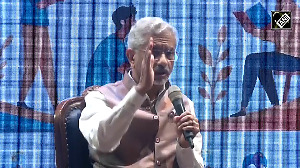The government came in for heavy criticism over the conditional access system by the parliamentary committee on Monday.
The 52nd report of the Standing Committee on Information Technology on CAS has accused the I&B ministry of introducing CAS without carrying out a proper study on the availability and the price of set-top boxes.
The committee, headed by CPI-M veteran parliamentarian Somnath Chatterjee, also recommended that the minimum number of channels in the basic service tier must be increased.
The committee flayed it for fixing a date for its implementation 'arbitrarily' without ensuring that measures for a 'smooth' rollover are in place.
The committee was of the view that the implementation of CAS, which was postponed from July 15 to September 1, be deferred.
Asked if the committee felt that CAS should be deferred beyond September 1, Chatterjee said the staggered implementation was a 'clear admission' by the government that it was not prepared for it.
"We want smooth implementation of CAS so that the consumer does not face any problem. Certain steps have to be taken before the government fixes a date," he told reporters.
"The I&B ministry does not have reliable figures on the total requirement of set-top boxes in the four metros. It also does not have reliable data on the number and quantity of set-top boxes being imported by the MSOs (multi-system operators), nor does it have any idea about the final price of set-top boxes," he said.
He criticised the I&B ministry for 'not making an effort to espouse the possibilities of indigenous production of the set-top boxes.
"Even the modest estimates of import of 20 lakh (2 million) set-top boxes initially will cost the nation about Rs 600 crore (Rs 6 billion) in foreign exchange," he said.
He insisted that genuine demand be assessed and possibilities of indigenous manufacture be explored in a given time-frame.
The committee also expressed serious concern over the inability of the I&B ministry to resolve the key issue directly affecting the interests of cable and satellite viewers, particularly due to the inapplicability of set-top boxes in case a subscriber shifts residence or shifts over to another MSO, as also in the case on installing of multiple STBs for subscribers having more than one TV sets.
"The ministry (I&B) could not resolve the issue of providing STBs on a returnable basis nor fix rentals for the same," said the committee report, while expressing concern that the amended Cable TV Network (Regulation) Act, 2002 has not provided for any complaint redressal mechanism.
In this backdrop it recommended that the I&B ministry should ensure resolution of all outstanding issues pertaining to CAS, affecting the common man within a fixed time frame.
Taking note of the fact that it costs a cable operator Rs 72 on the basis of cost plus reasonable profit to provide up to 60 channels as worked out by the task force on CAS, the report recommends that the ministry should increase the number of channels to be made available within the basic service tier to a subscriber, in place of 30 channels currently provided in the government notification.
Expressing the desire that the ministry should ensure transparency in the rates of the pay channels so as to avoid bundling of channels by broadcasters, the committee also instructed that such rates should be notified to the public as early as possible so that they can exercise their choice whether or not to opt for STBs.
The committee said CAS should be implemented systematically in a given time-frame by deferring the date fixed, if necessary, keeping in view the interest of the people without disrupting telecast of quality programmes and dissemination of information in any manner.
"In any case, cable subscribers should not be put into a worse situation after the introduction of CAS," the report emphasised.






 © 2025
© 2025